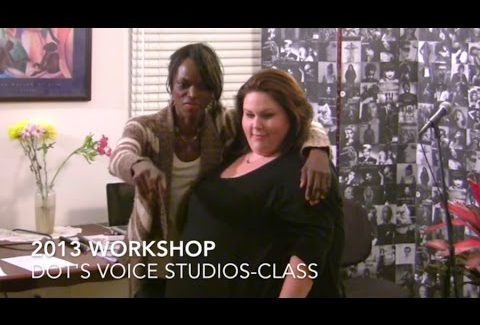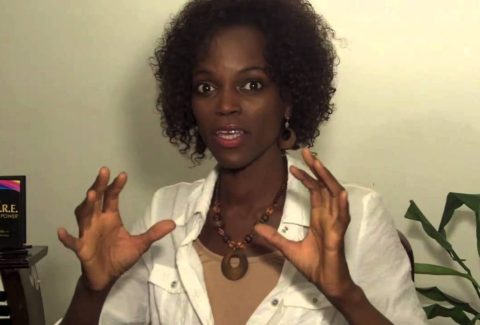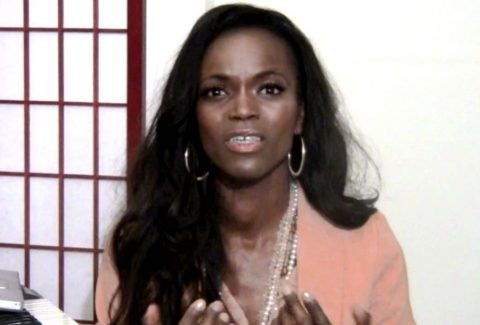How to Sing on Pitch – Part 2
How to Sing on Pitch – Part 2
OVERCOMING “EMOTIONAL” PITCH ISSUES
Now that we have discussed the physical reasons why people sing off pitch, I’d like to address something even more common. The EMOTIONAL ones. If you’ve read my book, “Mind, Soul, Voice: a path to vocal freedom“, or used my Practicing CORE Vocal Power CD, then you’re already aware that your whole instrument is your MIND, SOUL and BODY. If you want to progress as an artist, it’s important to look at your strengths and weaknesses with these three parts in mind – not just the physical.
Now we’re going to talk about the more common reasons why people sing off key, and what to do about it. This is where I get much deeper than the surface level. As I mentioned before, it’s easy to notice someone is off key – but if you can pinpoint WHY, you can change it forever, because you get to the CORE of the problem.
My Relationship to my Voice affects how I hit notes
I tell every singer that comes into my studio, “The relationship you have with your voice is directly related to your performance.” Sometimes they don’t really understand the depth of what I’m saying initially. Pitch issues are the perfect example to demonstrate this point. You will see how a person relates to themselves can either make or break their performance. There is a good chance you may relate to more than one of these–even all of them – but there might be one that you emotionally gravitate towards more than others. This is the one you want to start with, and get to the CORE of. Once you do that, you can correct the issue and you will notice, it has nothing to do with your vocal chords. Each of the following issues are rooted in one thing: FEAR (False Evidence Appearing Real). I decided to go a few layers deeper and discuss the kind of FEAR behind each issue. Now of course, if you experience all of these issues at once (which is completely possible), singing might be a terrifying experience for you. I encourage you to be patient with yourself and know that you are not alone. We all struggle with these issues – even if you don’t have pitch issues! Some people are better at hiding them than others–but would you rather hide them, or heal them?
Reason #7 – Feeling Helpless
If you feel helpless, there is a very good chance that you will be “pitchy.” Many people who like to sing fall into the mistake of feeling like they don’t know how to sing. Maybe they feel this way because they haven’t had any formal or professional training and this leads to them feeling unsure and helpless. This feeling may have also developed over time because someone may have told them that they couldn’t sing, didn’t sound good or they hit the wrong note. Oftentimes, it happened when they were young and still has left an emotional scar or vocal wound that needs to be healed.
If you connect or relate to what was mentioned above and feel helpless when you sing, you need to remember one thing…Knowing how to sing is a natural gift we all have. You were born knowing this. Yes – it’s true that some remember how with more coordination and power than others, but when you let go and just sing, you can indeed open the door to finding your CORE voice: that authentic voice inside you that just knows .
The kind of FEAR you are subscribing to most if you relate to this category, is the FEAR of being Judged.
To overcome this fear, you have to decide that you will still be ok – even if people judge you wrongly. I know – it’s a biggie, but you can do it! Do you want to be free, or do you want to let what others might do, control you? Clear your mind, relax your soul and Just sing! Still having a hard time? Click here for more support.
Reason #6 – Being afraid to “show up fully” in the notes of the song.
Ever heard someone sing before, and they seem to be doing well but then suddenly, the end of the phrase falls, or just sounds really off? The singer doesn’t show up. When I say “show up” I mean sing a note with your fullest potential in the present moment. That is required for the most part, if you want to be in tune, but can you think of reasons why someone wouldn’t want to?
These singers have decided to hold back because of the FEAR of commitment. Yes. I said it – commitment! You don’t really want to sing out fully because… what if you sound weak? So – as a defense mechanism, you sound weak. You give up before you start. Seems like an oxymoron, but you know what I’m talking about if you do this.
Maybe you showed up fully once and were criticized, so now you carry this little bit of trauma deeply imbedded in your psyche that shows up every now and then, just enough to make you think you are “weak” or “not powerful enough.” So because of your temperament, as a defense mechanism you sing through it, but at certain points, it just goes off key. Has NOTHING to do with your ear, and likely you do it much better when you’re alone – but even then, if you’re really feeling bad about the past criticism or looking weak, then yes, you’ll probably go off key alone as well. Overall, when you are deeply emotionally invested in the results, this creates more nerves, which show up as “pitchiness.”
So – how is this corrected? Take smaller risks first. Sing songs that are easier for you in front of others where you can feel safe showing up in each note, like the Beatles or something melodic. Don’t try to do a 12 point vocal run–it will backfire! Once you’ve learned the basics and can sing fully, then move to the harder stuff.
Pitch Correction Suggestions:
- Start with just singing notes and sustaining them to their fullest, or doing my CORE Resonating Program
- Memorize and sing one melody line to it’s fullest. (Example: “Twinkle Twinkle Little Star. How I wonder what you are.”)
- Sing the melody line to it’s fullest while looking into your eyes in the mirror. This will help you to feel more open and get over your walls when you’re singing
- Learn and sing a verse and chorus of a song while looking into your eyes in the mirror. Do not make embellishments, but practice being happy with how singing feels in the present moment. Don’t listen to yourself, but hear yourself. Record your voice so you can listen back to the reality of it.
- Now you can practice adding different stylistic choices to the song like dynamics, runs, trills, etc.
Reason #5 – Going into “Singing Mode”
Many singers seem to think that when they sing, they need to become something they are not. They feel they need to “pretend” to be the next American Idol, and exhort a huge amount of effort in the process. As a result, they “over-sing,” or over dramatize their performance, and this can result in going waaaaay SHARP! When people go into “singing mode” what they are really feeling on an emotional level is, “I have to try hard. I’m not good enough as is. I need to do something really big and important when I sing, so that people like me.”
The Fear for this group is FEAR of being really seen. (Am I getting too deep here?)
Pitch Correction Suggestions:
If you have this problem, how about subscribing to the following ideas?
- singing doesn’t have to be hard – it is EASY.
- I am enough as soon as I open my mouth
- singing is as natural as speaking
- it’s ok if people see who I really am.
Even if you can take one of these suggestions and work on it every day for a week, along with doing your physical exercises and warm ups, I guarantee you that you can correct this issue. But you have to have the courage to stop subscribing to the old wounds that brought you to this point. One last very good suggestion for this issue is to look at yourself in the mirror while you sing, while making eye-contact.
Reason #4 – Being afraid of actually hitting the wrong note
This cause is very similar to the prior one, only this time, the FEAR is actually “hitting the wrong note.” So now, the singer is preoccupied with the actual notes in the song, and obsessed with the idea that they are all going to be wrong.
It doesn’t matter how loud or soft or weak or strong their voice sounds – they just don’t want it to be wrong, so because of their temperament, they are unable to let go of this attachment. Of course, what we hold on to can hurt us – so they hit the wrong note! This goes along with the saying, “What we resist persists.”
This is an emotional need of wanting to look good, which is accompanied by a belief that hitting notes wrong is a huge deal that must be avoided or you will look like a complete idiot. It has nothing to do with how your vocal chords are working, or how amazing your ear is. If you have the best ear on the planet, but you have this emotional need to “look good” – or “to be perfect”, then there is a pretty good chance you’re going to have pitch issues. I will say that many people have these issues and still sing each note perfectly, but there is always an underlying dis-harmony and uneasiness when they sing, that sometimes audiences can’t peg. However, for the most part, these needs manifest as pitch issues in many people.
Pitch Correction Suggestions:
- I am brave enough to decide that the world will go on spinning- even if I do it wrong,
- I am OK No matter what!
Example of Emotional Pitch Issues: I taught a young lady once – we’ll call her Mary, who was unable to authentically speak her truth, (a 5th Chakra Issue). At the same time, she suffered from random pitch issues that were very unpredictable. Once she was able to come to terms with expressing how she really felt to others on a daily basis, her pitch miraculously became more accurate! As she cared less about what others thought, released her victim mentality and gained the courage to know she’d be okay–even if it wasn’t perfect, she could get through a whole song without having any pitch problems! Interestingly, Mary had been to several coaches and never made growth. After only two sessions with me and practicing some of the tools in this article, her whole life changed and her CORE Voice emerged! I will say that for most, it takes a little longer than two lessons. It just depends on you, and how easily you can embrace the courage to just be your FABULOUS SELF!
I know, I make it sound easy, but it can be if you let it. It’s up to you to decide how much you want to cooperate with yourself enough to work through any of these issues. Remember, your relationship to yourself is a key factor to having an empowered voice. Every day I see this issue and more often than less, I have found that pitch issues are related to unresolved psychological and emotional issues.
So, those are the four main emotional reasons why people sing off key. Do you experience any of these issues? Please tell me below in the comments if you can relate to any of these issues and update me on your progress.










Comments (31)
Nabila
Dear Dot, Im your skype student from Pakistan. I had done one session with you. Thanks so much for your lovely tips pls send me more whenever you can. God bless you. Warm Regards Nabila
Dot
Nabila! So great to hear from you and I’m so happy you found this useful. Keep on singing hon! 😉
Kim
Hi Dot,
I have a PECULIAR MENTAL EAR issue! I couldnt hear when I sing a note in the wrong register that is 1 octave lower or higher! Another mental blindspot is melody phrases wrttien with a bunch of Repeat notes, or Semitone or whole tone apart bunched together, I tend to sing them in FURTHER INTERVALS apart unconsiously.
Some phrases I can play the melody notes correctly on keyboard but sing them wrong and not know it, alternatively, Certain other phrases I can sing the melody right but cant catch it on keyboard solo CONSCIOUSLY.
I find others sing more melodious than I . I was told some songs I sing my own imagined tune different from original melody. The problem is I am not aware of iteven if I listen to the original songs many times.
Apart from the above, I am mostly ok and can self correct minor micro semitone pitchiness here and there cos I can hear them and I can sing scales. How can I help myself? I have been learning to sing for 40yrs and still cant overcome my blindspots. Anxiously hoping you can advise me breakthrough. Bless you.
Kim
Kim
Hi Dot,
I have a PECULIAR MENTAL EAR issue! I couldnt hear when I sing a note in the wrong register that is 1 octave lower or higher! Another mental blindspot is melody phrases wrttien with a bunch of Repeat notes, or Semitone or whole tone apart bunched together, I tend to sing them in FURTHER INTERVALS apart unconsiously.
Some phrases I can play the melody notes correctly on keyboard but sing them wrong and not know it, alternatively, Certain other phrases I can sing the melody right but cant catch it on keyboard solo CONSCIOUSLY.
I find others sing more melodious than I . I was told some songs I sing my own imagined tune different from original melody. The problem is I am not aware of iteven if I listen to the original songs many times.
I have been learning to sing for 40yrs. Anxiously hoping you can advise me breakthrough. Bless you.
Kim
Dot
Hello @Kim! Thanks for your questions. It sounds like you have a lot going on in your mind. My best advice is to learn how to BREATHE from a very grounded place, then from here, you can ALIGN to the rhythm, pitch and melody, and then TRUST yourself to do it right. It sounds like you might be trying to over-think a lot based on what others are telling you and it’s just confusing you. Without really being able to experience your gift, it’s hard to diagnose the issue, but what I shared will always help. Feel free to reach out to me via email and or schedule a Skype with me and I will be able to help you further. 😉
Louise
I can definitely relate to all. Part 1 and Part 2 definitely me. I grew up singing in my family’s gospel group, but was always afraid to lead solos. Literally shaking. As I became an adult, I decided I wanted to really do this, but my pitch is always off. I’m very critical of myself how I sound, what people will think. And holding back on the note us me and I end up sounding weak. I am willing to put in the work. But it just seems so hard. This information you have is very helpful and I do plan on trying the suggestions. Thanks
Dot
Hi @Louise, I’m so glad you are exercising the patience to recognize your blocks and move through these issues! Keep up the good work!
River
Where can I find the last 3 reasons?
Dot
Dear River, You can find the last 3 reasons here https://www.dottodman.com/blogs/singspiration/how-to-sing-on-pitch-part-3
Sylvia Hughes
I am so frustrated right now..I lead Praise and Worship but I tend to over think my notes and come in wrong..We do not have adequate rehearsals and the congregation act as though I am throwing a concert..I know my focus should be on God and God only but I feel like giving up..I feel inadequate as a singer and worshipper..I need help.. Our sound system is horrible and I can’t always hear the musicians. I know I need to practice more but it’s like pulling teeth to get people to commit to coming to rehearsal. I feel like I have disappointed God..I need guidance..
Dot
Dear Sylvia,
Quite some time has passed now. How did it turn out for you? Did your circumstances improve? I know singing can be frustrating when we overthink things. That’s why having a foundation or structure to help you stay out of your head and get optimal writing in your nervous system is key to success. Hopefully you got my free download which has some useful information in it about how to let go and what to pay attention to when you sing. If you don’t already have it, please get it here https://www.dottodman.com/pages/free-voice-lesson-sample and thank you for your patience in receiving my reply. As I now have a new website, many of my emails were buried!
Emily
I just read through this today. I am so glad someone finally addressed how much thoughts and emotions play into singing. Everytime I sing I seem to go into a panic during the song and become very pitchy and will hit wrong notes. Thank you for listing ways to overcome this. Things I had tried in the past did not work.
Dot
Dear Emily, I’m glad this is working for you! Keep up the good work. With patience and trust, you can do it!
Victor
Hii, I’m having a problem, I recently started taking singing classes, but my voice is always a tone down. I think that’s because when I hit the note I think my voice doesn’t sound manly, so in my attempt of making it sound manly it seems that I’m always a tone down from the actual note. Please help me, what can I do? Thanks
Dot
Dear Victor,
It sounds like you have identified your problem; you think your voice “doesn’t sound manly.” This thought is creating a pitch issue for you because as a result, you are putting an unnatural burden on yourself before you even sing. I’m hoping by now you have improved, but if you have not, please read my book, “MIND, SOUL, VOICE, A PATH TO VOCAL FREEDOM” I’m giving it away as a free download along with some exercises you can do to help you overcome self judgement. Just allow yourself the freedom to sound however you are going to sound on your pathway to becoming better. If you put so much pressure on yourself to be perfect, your voice will feel betrayed and you won’t get the results you want. Let me know how it goes, and here’s the link. https://www.dottodman.com/pages/free-voice-lesson-sample. Sincerely, Dot
Linda
I’ve always been confident when I sing and to be quite honest I do have a powerful voice and have always sung and performed in front of people ever since I can remember. I joined a choir and auditioned to do solos. Recently, our choir director have told me that I sing flat sometimes and need to work on that issue. I auditioned to be in this choir and made it; I auditioned to join the 15-member ensemble and made it; I have been singing in this choir for over 5 years. I had never had formal voice training and I know I can really benefit on getting professional training for my breathing techniques. At a big event, I was asked to do the solo on a song that I had auditioned for. At tech rehearsal, I thought it went well but about a half hour before performance, our director pulled me out of the solo and told me that I need to take some voice lessons. Confidence crushed! Weeks later, he asked me to do this same solo for an upcoming concert. During rehearsal on the day he told me about the upcoming solo opportunity, he called me to do the solo. At this point, I didn’t feel confident, I felt I will be flat again. As I listened to my recording of that rehearsal, I heard myself going flat a few times and that has not happened to me before. How can I overcome this fear now that I never had before?
Dot
Dear Linda,
Thank you for sharing your story. This is something I hear commonly. People being told they are “flat” or “sharp” with no guidance at all. Anyone can tell someone they are flat or sharp, [which truly is a normal part of singing for most people. It happens and it’s nothing to be ashamed of] but the real question is “why was I flat or sharp?” This article explains many of those reasons, but YOU asked how you can overcome the FEAR of being flat – not how not to be flat, which I’m glad you asked. This is going to sound obvious, but simply – accept that it’s not the end of the world if you are flat, and love your voice enough to never let anyone make you feel bad for being imperfect. We live in a world that is imperfect, and yet it is obsessed with perfection. Please read all three parts of the article, because what’s most important to realize is that your positive relationship to your voice is key to being empowered. Obviously, you must be a decent vocalist if you keep getting asked to do a solo, so you probably have less of an issue than you think. Let me know how it goes and KEEP SINGING! 😀
Giff Smith
Hi Dot, great article. I am a singer song writer and have struggled with the ‘you cant sing’ journey. I have been at it for a couple of years. Funny thing happened just recently, I was playing at an open mic and I was singing some grunty songs. For the first time I experienced being consumed by the music it was almost as though I could see the music and my voice fell in behind with complete compliance. It was a wonderful experience. Everything just clicked, I used my whole abdominal cavity as a large balloon, I pushed my belly button through my spine, I did the mental drop of the cliff to soar to new heights. What you have written here is what I experienced. A great article, thank you! Giff.
Dot
Dear Giff,
You are welcome! I’m glad you enjoyed this and keep up the good fun!
Sincerely,
Dot
Joy Jones
Dear Dot,
The points you raised about emotional and psychological issues being the cause of flatness is spot on for me. I sometimes cringe when l listen to my recordings and realise that I’m so off pitch particularly at the end of the phrases.
I’m petrified of criticism l grew up with it and l do a lot of holding back when asked to sing. I never ever imagined that my fearful approach could be linked to the way that l see myself. You’re spot on. I want to find my voice. I already sing in a gospel choir but have no core strength. I can sing quite strongly in the lower register but my voice is breathy overall. It’s either that or l over sing and sound desperate. Help! I have a good ear as lm a music teacher… So why am l singing flat at times?
Thanks
Dot
Dear Joy, it’s hard for me to know why you are singing flat without being able to observe what you are doing, but it sounds like you are beginning to realize that it can be a combination of how you relate to your voice and your physical connection (or dis-connection) to it, which is tied heavily in overall technique. The best way to get clear on what’s going on in a deeper level, is to get present with how you are really thinking and feeling and know that you can connect to your own safe space when you sing. Most people don’t feel safe, like you stated above. It’s pretty heard to allow the right kind of breath support and balance in the cords if you don’t feel safe inside. And breathiness in the voice is a red flag, so be careful. My book, “Breathe Into Your Power” can help you build more presence in your mind, and peace in your soul, and my CORE VOCAL POWER Bundle can help you address the physical issues of your voice, as well as the mental and emotional. Other than being able to analyze you myself, I’m not sure what else I can offer you, but I certainly wish you the best in your vocal journey. Sincerely,
Dot Todman
Your Vocal Empowerment Coach
max burner
I am so happy I found this article! I’ve been singing in earnest for a couple of years now, and despite learning and practicing proper technique, I still found my intonation to be inconsistent. I always knew intuitively there was something else going on, and it is very affirming to know that singing isn’t merely technical concerns. thank you for the encouraging information Dot!
folasade
enter your comment here…am just reading this piece, and I found it to be a blessing, all I know is that I have not gotten it right, I always go off key anytime I sing
Becky
Dear Dot, I’m a singer and a lover of music, but sometimes when I sing whether trying to pitch a note or singing on a convenient key I go off and I must confess it’s really embarrassing and this has made me lose some interest in singing cause I just often think I can’t make in the music aspect pls help me I really love to sing. I sing flat
Connie
Dear Dot,
Where do I begin? I used to LOVE singing! Then one day when I was about 12, my mom told me I couldn’t sing. I stopped singing around the house. I didn’t join Choir in HS. I wouldn’t even sing around my boyfriend. Once married, I began to sing to my children, then in the car with them. One day after being married for many years, my husband walked in on me singing my heart out. He was shocked that I could sing. I was embarrassed, but slowly I overcame my fear. My husband is our worship leader at church and one day I told my husband I’d like to sing on the team. He was hesitant, but said, ‘sure.’ That was four years ago. One time during practice, our piano player said I was singing ‘flat’. Ever since then, I’ve been aware of that; so much so, that I’m listening to every note, rather than singing from my heart. Anxiety is setting in and I’m ready to step down from the team. My hearing is not the best and I wear hearing aids, but I feel like I’m not ‘hearing certain notes correctly. Two other women in church have made off comments to me. “You know you like being up front” “So, how did you come to singing on the worship team?”
All of this keeps playing in my mind like a broken record. I can’t shake it. Perhaps all this negative talk is the real culprit, and not my hearing?
Dot
Dear Connie,
Thank you for reaching out and sharing your story. Yes, you are correct, your negative talk is the culprit, and good on you for identifying that.
Think about this: if you noticed one of your talented children barely singing flat, would you hide them and discourage them, or teach them how to support their voice properly and nurture them? Your voice needs that same love and acceptance.
I have not heard you sing, but assuming maybe there was truth to the statement this lady made, singing “flat” has very little to do with your ears and usually way more to do with simply not supporting your voice from your diaphragm and keeping a nice relaxed neck while singing. It’s not a big deal. Everybody does it every now and then. It’s just part of the journey, and why stretching out your voice and exercising it to keep it in shape is important. Your voice is an amazing instrument that can teach you so much, because it’s the only instrument I know of, that requires you to fully love and accept it, (in any situation, unconditionally,) in order for it to work properly.
KEEP SINGING! Be true to your voice and keep letting it shine!
Serena
Dear Dot, I feel singing is not my thing, like I’m the worst on earth when it comes to singing or music. Whenever I sing, I’m always afraid of singing off, and I can’t go high while singing. Whenever someone starts a song, I will always sing the lower octave of that song. Countless times, I was told I’m an alto singer. I need help…
Dot
Dear Serena,
Thanks for reaching out! I’m hoping all three parts of this article helped you, because there is a pretty good chance you are a much better singer than you realize. Also, there’s nothing wrong with singing something an octave lower if that’s where you’re comfortable. I really have no way of knowing how to help you without hearing you sing. If you’d like to apply for a complementary phone consult, click this link. https://www.dottodman.com/pages/contact
Holuwasheye peter
Hi Dot. Have been having issues with my singing, when am singing, thinking that am doing well, people around me will always tell me that am always going off key. And I don’t know how to go about it
dottodman
Dear Peter, thanks for your question. Without knowing your specific singing situation,who the “people” are that say you’re off key, and not having heard you sing myself, my guess is that possibly reasons #9, #5 or #4 in this article apply to you. Read them over and let me know if they are helpful. If you are in a choir or group, that may be a different situation. Overall, I’m just encouraging you to really tune into the music with your body and let it guide you more than your brain.
Hope this helps.
Sincerely,
Dot
Edith
When I’m singing my hands are always shaking and and I then lack composure.